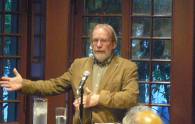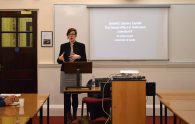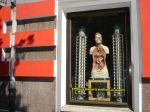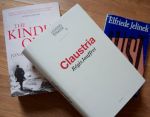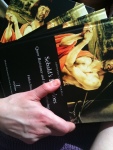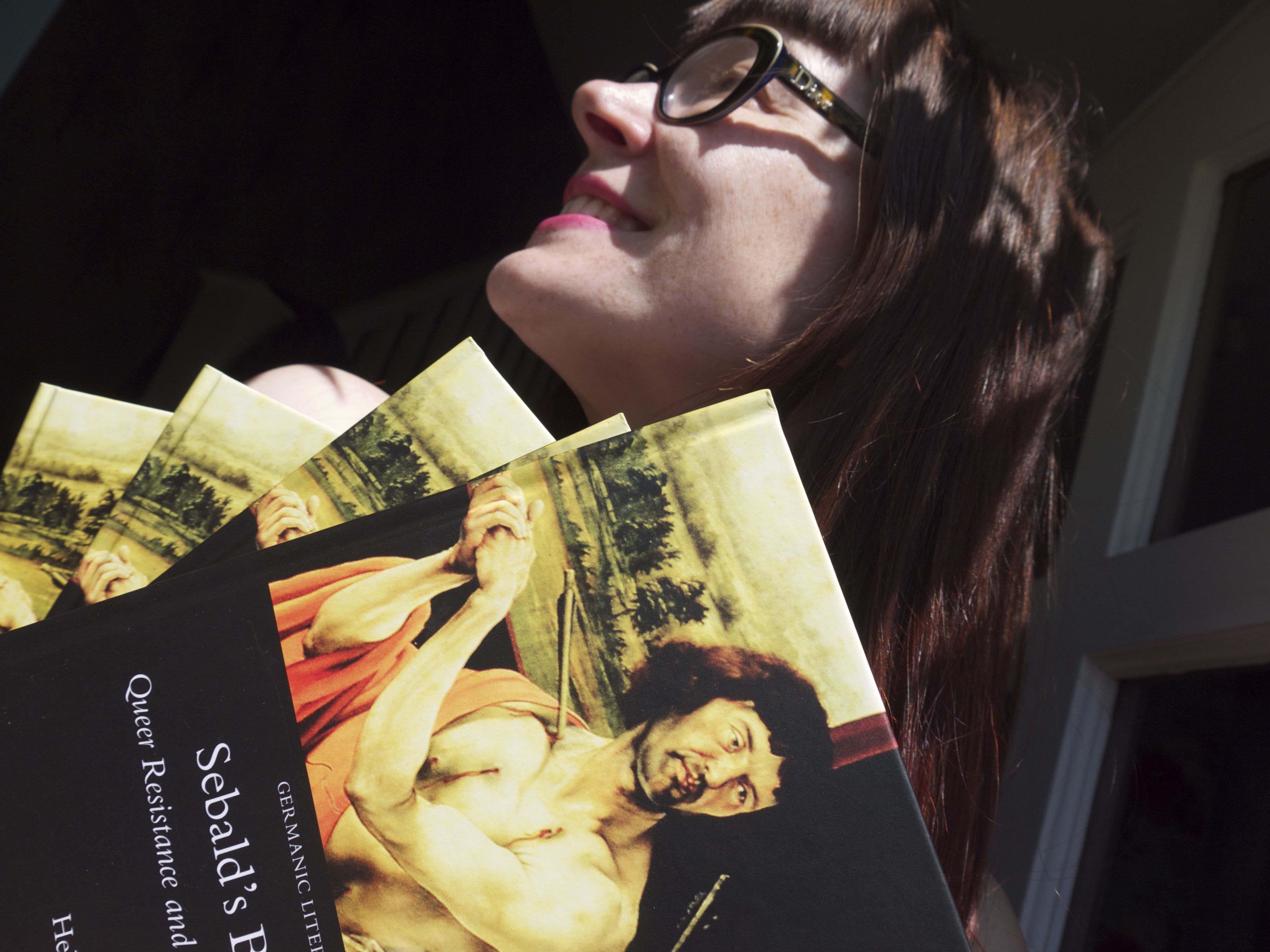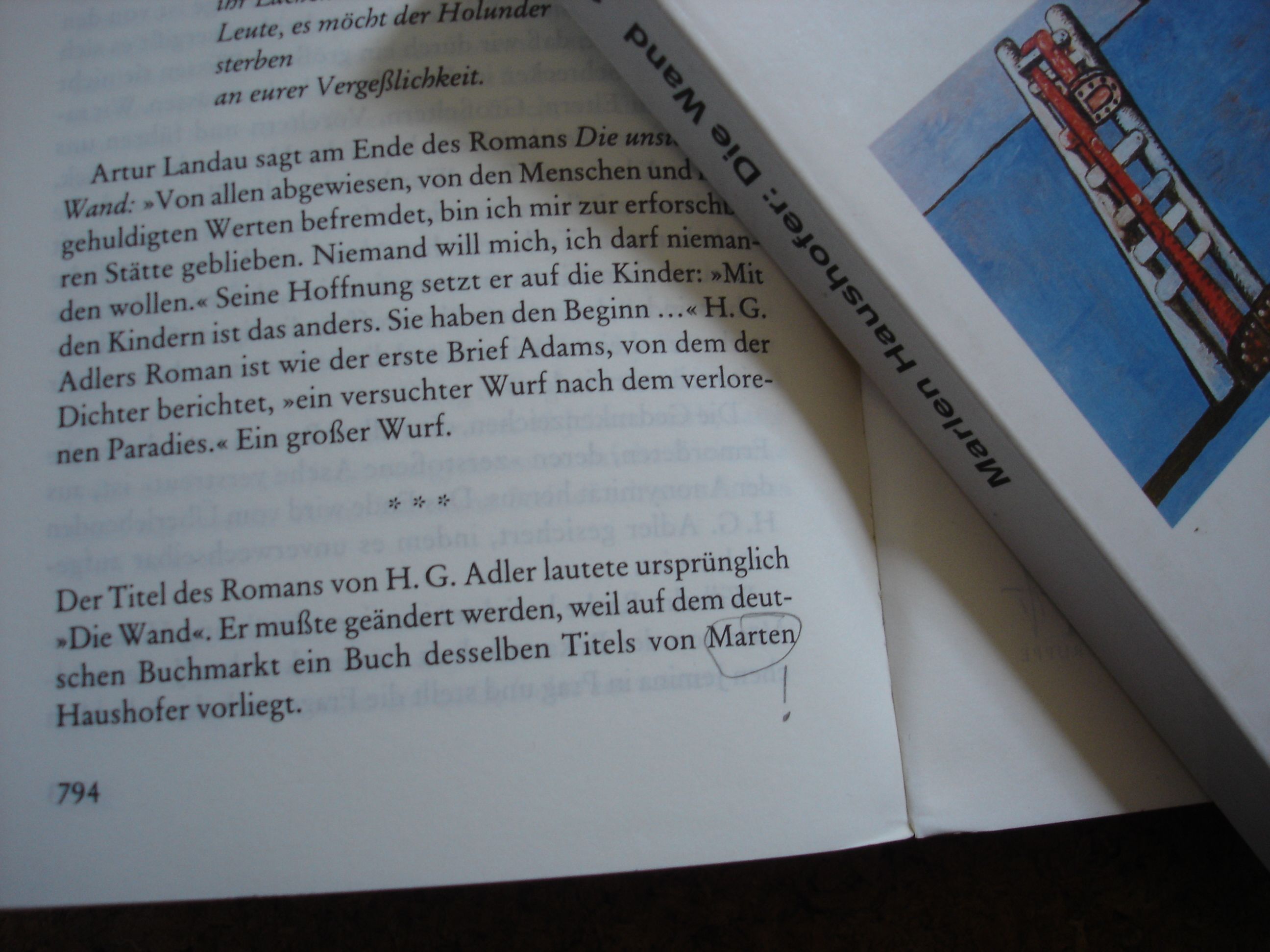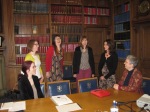Sabbatical came to an end, and with it the spare time and reflective capacity for regular blogging. This makes me sad, and my new year’s resolution is to communicate far more on this blog, for there are many brilliant projects I would love to share with you and hear your input on. In lieu of a proper narrative post, I am going to give you what has become known as a listicle; a list of all the books I read this year, on trains, planes and late at night, when I wasn’t reading articles or academic books. The Holocaust novels were work books, but the rest were read for pleasure, if only, I fear, the childish pleasure of sneering, in some cases.
(Last year’s Friday Reads are here.)
Novels about the Holocaust
Der Siebente Brunnen, by Fred Wander was probably the best, Ruth Klüger’s unterwegs verloren was as well as a memoir of post-Holocaust damage, a salutory warning about life in the German studiesacademic trade. Also, Chasing the King of Hearts, by Hanna Krall, a Polish Holocaust melodrama; Jakob der Lügner, Der Boxer and Bronsteins Kinder by Jurek Becker, who is schmaltzy and strangely sad, and Nackt under Wölfen by Bruno Apitz, now fallen out of favour owing to having been a communist. I cannot say I recommend the novel, precisely, but I do think it is a fascinating phenomenon. Also Mendelssohn is on the Roof, by Jiri Weil, a Czech survivor, an unbearably beautiful and elegant Holocaust novel about the occupation of Prague. Read it.
Otherwise, novels in rough order of reading:
Translated by Jamie Bullock: Birgit Vanderbeke, The Mussel Feast, a timeless classic about a domineering father, perhaps a little dated thanks to its link to the fall of the Wall, but then not.
– The Taste of Apple Seeds, by my beautiful ex-DAAD-lektorin, Katherina Hagena, who fed my imagination with German Romantic water nymphs and lent me a bike in Hamburg in 1997. A satisfying family saga with a happy ending, drenched in the atmosphere of the apple country around Hamburg.
Capital, by John Lanchester: Why don’t people write capacious nineteenth-century Trollope-esque books any more, critics cry? Well, now they do, in spades, and they clank and creak and groan with their oldfashionedness. In Capital, Asians are all hardworking corner shop managers or impressionable young terrorists, bankers are wankers and African refugees clever, hard-working and doomed. The property bubble serves as a metaphor for the British nation, except when deserving people inherit the unearned wealth. Very, very readable, and certainly an improvement on the dreadful December, where Sebastian Faulks tried the same trick from a sour rightist perspective.
Room, by Emma Donoghue. Why not take the tragic Fritzl case, strip it of all its political aspects, set it in milchtoast American suburbia, and turn it into an allegory for attachment parenting? Because you’d get this mawkish book.
Claustria, by Régis Jauffret. A far darker, nastier, more political retelling of the Fritzl story. I am still not convinced that it is a story worth re-telling.
Poor Miss Finch, by Wilkie Collins. LOFELY FEENCH, a beautiful rustic English maiden, is blind! With a terror of the colour blue! And then she falls in love with a man who TURNS BLUE! And then she’s cured of her blindness, so his NON-BLUE TWIN must masquerade as him! Poor Miss Finch! This is a great book.
Metropole, by Karinthy Ferenc. This was a random Kindle purchase, but perhaps the best book of the year: elegant Hungarian modernist allegory of the absurd and the existential in the city, Miéville meets Kafka meets Zamyatin. Excellent, and wonderfully translated by George Szirtes.
The Devil I Know, by Claire Kilroy. Another elegant allegory, this one of the Celtic Tiger. Also wonderful, and genuinely unheimlich in parts, with the devil dancing rings around Howth Head.
The Mill for grinding old people young, by Glenn Patterson. A Belfast historical novel that I wanted to love, and that sung with description, but didn’t really speak to me.
Dotter of her father’s eyes, by Mary M. Talbot. Graphic memoir about her own life story interwoven with Lucia Joyce’s. I enjoyed it, but my Joycean knowlege is too coloured by the O’Brien Nora biography for me to buy Talbot’s sympathetic portrayal of Lucia as a victim at the hands of her uncaring father. By all accounts I have read, Lucia was very sick and Jim did his absolute best to support her independent and creative life.
The Casual Vacancy, by J. K. Rowling. Now if you are going to do latter-day nineteenth-century bourgeois novels, this is how to do them: with a searing Labour-driven rage about social injustice, vile and horribly real teenagers, the toxins of snobbery and the nastiness of the housing market, in a wee English town. Much, much better than Harry Potter, and a real treat.
The Soldier’s Song and his two lachrymose companions, by Alan Monaghan. Irish First World War saga. Excellent comfort reading in the dog days of summer.
Railsea, by China Miéville. He quits the discredited Socialist Workers Party, he writes rollicking classics like these. He’s on a roll. Hooray for Miéville.
Far North, by Marcel Theroux: A dystopian fantasy too icy to melt my heart. And one that makes little emotional sense, saving as it does its brutalised heroine’s innocence to the end. But well put together, if you like that kind of thing.
The Dinner, by Hermann Koch, because it was a quid on the Kindle. A Dutch Lionel Shriver. This is not a compliment.
A Few Green Leaves , by Barbara Pym. WILL the village spinster marry the vicar? I am sure none of us can wait to find out!
Americanah, by Chimamanda Ngozi Adichie. Now THIS, this is what excellent middle-brow fiction is all about. Hilarious, absorbing, political, internetty, sexy, with good fashion and astute observation of displacement, adolescence, America, Nigeria. I wanted it never to end.
1913: The Year before the Storm, by Florian Illes. Illes made his name with a pop book called Generation Golf, and this drops just as many brand names, only this time they are modernists – Mahler! Mann! Proust! – instead of 80s consumer gadgets. But the effect is the same.
TransAtlantic, by Colum McCann: about the arduous crossings between Ireland and America, of one family’s story and the unexplored undersides of transnational Irish history. I adored its unhurried but absorbing tales: the link between Frederick Douglass and the unimaginable horrors of the Famine, the first airmen’s adventures and the devastation left behind by the Troubles. Then I read a review that pointed out it was more than a little sugary and uncritical, and felt a little ashamed of myself. However. I enjoyed it immensely.
Freedom, by Jonathan Franzen: Oh, Franzen, your questionable Kraus Project, even if it does focus on Austro-Hungarian modernism, has done little to endear your writing to me. Guess what? Locking yourself in a room away from the internet does not seem to yield brilliant insight into a world of literature and imagination! I fear that such celebrated isolation might instead produce smug and introverted fiction that is witless about reality. Freedom is supposed to be another neo-realist novel that saves plot and character from the clever-clever onslaught of postmodernism, but unlike proper C19 novels, and unlike Lanchester and Rowling, not one of his Mid-Western characters has to worry about money. I repeat: the novel is a State of the Nation take on the Dilemma of Freedom, but without money constraints. It’s the worst kind of white man’s fantasy about human nature. Franzen, please recall: from Austen to David Lodge, the motor of the bourgeois novel is money, who has it, who inherits it, who steals it, who dies for lack of it. Also, your writing style is leaden and your book is far, far too long.
Leaving the Atocha Station, by Ben Lerner: one of the neo-cosmopolitan novels written by young brilliant Americans in the wake of Teju Cole. Chilly, perhaps frozen by history; it is a good book, drenched in booze and sex and intellectual failure, but not a perfect one.
Rivers of London and all her foxy daughters, by Ben Aaronovitch. I am late to this party, but what a party it is. I and the rest of the planet adore these books. You like silly fantasy? You like escapist Londony fiction? You like Miéville but could do without the pompous intellectual fireworks? Run, don’t walk.
Mr Penumbra’s 24-hour Bookstore, by Robin Sloan. But run AWAY from this one. If Mr. Penumbra had been published fifteen years ago, it would have been called an Internet Novel, because it’s all about the tussle of Google versus the Book. Nowadays, all novels are internet novels, so it has lost its novelty. This is NaNoWriMo-esque drivel, featuring a nerd, a manic pixie dream girl and a Mysterious Magic Bookshop, reconciles Google and the novel overnight in a sugary marriage not unlike the end of Metropolis. Mr. Penumbra makes me sorry about the future of the novel; the Kindle hasn’t killed it off, but what has it done to impressionable writers’ skills?
The Property, by Ruta Modani. Israeli graphic novel about a family returning to Warsaw to try and claim the family home. Bittersweet, with some vicious satirical bite, and quite a bit of sentiment. The love stories overwhelm the politics, in the end; how very heartwarming.
Long Walk To Freedom, by Nelson Mandela. Read just before he died. It is somewhat hard work, and you can tell when the editor pleads with the inveterate politician to put in some personal colour among the endless committee meetings, but gosh, it is an education. Essential.
In Love’s Place, by Etienne Van Heerden. A serendipitous discovery; I wouldn’t have read this if I hadn’t met Van Heerden at an event in Bloemfontein, but I actually think it’s rather good. Sombre, reflective, sprawling saga of post-apartheid life in Cape Town and the impoverished badlands thereabout.
NW, by Zadie Smith: some called this a daring modernist experiment; I say that modernism is a hoary old box of tricks invented a hundred years hence, and NW reprises some of them without any great aesthetic innovation. The heart of this novel, about a working-class Londoner’s education as a lawyer and the vicious multiple obstacles put in the way of poor black kids, is wonderful, the rest could go and hang out in Lanchester’s Capital. Definitely worth it, but perhaps would be better as an incisive novella, not a baggy Smithy novel.
When We Were Bad: A Novel, by Charlotte Mendelssohn. Family saga in Jewish North London. Funny, somewhat truthful and absorbing, if a little heartwarming in the end.
Bridget Jones: Mad About the Boy, by Helen Fielding. Oh, we all love Bridget. We love her most pissed and on Twitter, and least having a mawkishly perfect relationship with her angelic posh moppet children, but she’s still always great fun to hang out with.
Stoner: A Novel , by John Williams, the Rediscovered Classic of the year. Beautifully sombre mid-century modernism, and the pains and truths of a life in academic literary studies unfolded. Stoner never publishes but the one book, the book of his thesis, and he dies holding the book, all alone. Nonetheless, his students love him and Stoner truly believes in letters; perhaps that belief and that love is all a life needs. I can see why John McGahern loved this novel. A truly great novel would have turned to look at the nasty gender and race issues that it pushes aside in favour of the white male American tragedy, though.
The Goldfinch, by Donna Tartt: endlessly self-indulgent, dear, and with that ghastly middle-brow fascination with high art. Stop telling me how wonderful the seventeenth-century painting is, how noble the unworldly furniture restorer, how vile Las Vegas is and how poetic your tiresome drunk Russian teen. Stop talking, Donna. Now look around. Where has your plot gone? Is it about that manic pixie dream girl? That terrorist event in New York? That implausible painting heist? Stop and think. Oh, all right then, don’t bother, just keep on chundering out those drug-addled monologues. Everyone will buy you and review you anyway.
Another Country, by James Baldwin, my current read. Blistering mid-century modernism that turns around and snarls brilliantly, queerly in Stoner’s lumpen mid-western face. While freshening everyone’s drink, of course, because that is what everyone does even in the most luminous and scorching of mid-century modern American novels.
0.000000
0.000000

